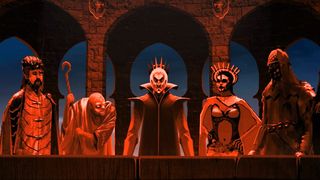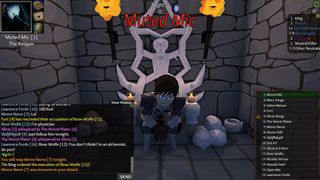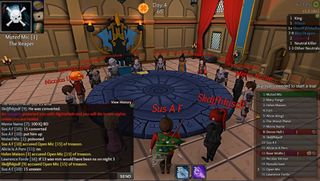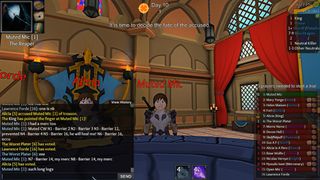Throne of Lies is a secretive party game where your chat logs can get you killed
40 unique classes and some new rules turns Werewolf (maybe you know it as Mafia) into something special on PC.

Conspiracy is afoot in a medieval kingdom. In Throne of Lies, 16 players gather at a castle, each with their own goals. Most of the players belong to the Blue Dragon faction, the blissfully ignorant good folk with no idea who anyone is playing as. Two players are conspirators, who always know each other and work together to destroy the Blue Dragon by converting some to their cause and killing the rest. Furthermore, there are between two and four neutral players with their own agendas, one of whom wants to kill all non-neutral players. Finally, there is the King, whose allegiance is unknown to anyone else.
Rounds are divided into a day and night cycle. Every day, players talk with each other in a public chat and in whispers (aka sliding into one another's DMs), and may accuse someone of treason. If you’ve ever played Mafia or Werewolf around a campfire or card table, you’ll have a head start here. The accused will defend themselves and the players vote on whether to execute or pardon them. When the sun goes down, Blue Dragons can heal, disrupt, or investigate other players for clues, while the conspirators gather to assassinate or convert a player to their cause. All of this is represented via cute 3D characters gathered around a table in the heart of some grand fantasy keep.
In addition to their faction, each player is assigned one of 40 unique classes that determines their abilities. This is where the beauty and challenge in Throne of Lies, uh, lies. Spreading deceit and confusion requires knowledge of how various classes function. You can check how each class works from an in-game menu, but knowing the most common classes by heart helps immensely. To name a few, The Alcoholic is an Unseen faction member that can redirect other player's attacks to themselves, all the while staying immune to those very attacks. Tanky. The Possessor is a neutral class that can't die at night and steal other players' bodies. The Hunter is a Blue Dragon that can summon a wolf to attack other players and a bear to protect themselves. Rad, but consider the remaining 37 classes and you have what is possibly the most complex game of Werewolf ever.
Getting to know the glut of classes is an intimidating barrier to entry, and creating accurate logs of your actions is another. Players maintain a private log of their actions—true or false—and are often asked for their logs, especially when accused of treason. No logs means no life—suspicious logs are one of the main ways to get executed by the court and if they don't match up with your chat logs, you're toast. For evil characters logs are particularly troublesome as they need to create fake logs to pose as something else. It’s an extra layer of confusion and bookkeeping for something based on one of the more relaxed and hands-free social games, but logs are a clever way to leverage the keyboard for more than chit-chat.
To give you a better idea of what navigating Throne of Lies’ layers of deceit looks like (and to demonstrate how it differs from IRL versions of the same concept), here’s how a recent game of mine turned out.
How it plays
On the morning of the first day, I greet my peers with kindness. I don’t share who I am with them, but if asked, I will tell them that I am a Court Wizard. In truth, I’m harboring a dark secret. I am the Reaper, and I am here to kill the loyalist Blue Dragons and the conspiring Unseen alike.
As night falls, I start to work on my plan. I pick one of the sheep at random and reap their soul during the night, leaving behind a mindless husk for a day.
The biggest gaming news, reviews and hardware deals
Keep up to date with the most important stories and the best deals, as picked by the PC Gamer team.
The second day is full of chatter, but the court cannot agree on who the Unseen are. I watch from the sidelines, trying to look for weak, unguarded targets. I think I find one, but when I attempt to reap their soul during the night, I’m denied. Somehow, they’re immune to my attack. My guess is they’re the Mastermind of the Unseen, the leader of the evil faction who cannot be killed at night. I need to keep an eye on them and get them executed by the court when the time is right.

The third day is, again, much talk, but little action. My kill from the first night is revealed, and the group comes to realize that a Reaper is roaming the grounds. But they direct their search in the wrong direction and accuse someone else for my crime. After a fierce debate, the vote is split and the accused is pardoned.
Alive for another round, I sit on my throne of bones, plotting to reap another soul. I find one, and try to take them, but find an empty room instead. The Prince, a unique Blue Dragon member who can jail people for a night and execute them if he is unhappy with their tales, must have taken them to the dungeon before I got there. Another night wasted.
My patience might pay off yet because the fourth day provides me with an excellent opportunity. It doesn’t look good at the start—I’m poisoned by an Assassin, and plead for someone to heal me the next night. What the others don’t know is that I can’t die from poison, but having it cured by a healer confirms that I was attacked by the Unseen and am not one of them, providing a convenient alibi.

As soon as the healer departs, I head out for a new kill the following night, this time taking down the Prince. Excellent. He was a fearsome foe who could have jailed and executed me if I wasn’t so damn clever.
A few days fly by without major incident. The Unseen get a couple of kills, and one of their members is found and executed during the day. I add new souls to my collection as well. Finally, the Mastermind is discovered when a Knight attempts to attack him at night, but fails. Just in time, too. There are still enough Blue Dragon members left to set up a court and execute the Mastermind. Victory is near.
But I make a fatal mistake. While pursuing my class goal, I reap yet another Blue Dragon member and the Unseen kill one more. There are only four people left in the court: a neutral Alchemist, the King, one Unseen Assassin, and me, the damn Reaper. The others haven’t figured it out like I have, so the Alchemist accuses me of being an Unseen and the King joins him and uses his ability to set up a trial. I’m sentenced to death. I should have reaped the King at night to prevent that, but here we are.

The Alchemist then teams up with the remaining Assassin, and they take down the King at night. The kingdom is in ruins, and Unseen take the win. I didn’t satisfy the Reaper’s goal, but hey, at least my accusers bit the dust, the jerks.
Throne of Lies, like other social deduction games, can feel random or unfair at times. Packs of murderers roam the castle at night, so sometimes you end up dying for no reason on the first night, which can be frustrating. You can stay and watch the game after dying and talk with other dead people, but because this is the PC you can also leave and queue into another game immediately. No sitting around necessary.
It’s a complex beast and anyone leaping directly in from Mafia or Werewolf will have some studying to do. A scripted tutorial shows you the basics, and you really should complete it before your first live game, but it takes some more work before you can comfortably navigate the web of lies. However, it’s this complexity that keeps Throne of Lies fresh dozens of game in. It's easily worth the time if you’re interested in social deduction games but don’t have a living room full of friends at the ready.
Most Popular





